Analyzing the Colonial Roots of Today's Global Culture and its Impact
VerifiedAdded on 2023/06/14
|9
|3081
|397
Essay
AI Summary
This essay examines the proposition that the increasingly recognized global culture is a legacy of colonialism, focusing on the historical context, particularly through the lens of Russian and European colonial practices. It discusses how colonialism facilitated global interdependence through the movement of people, technology, and goods, and how early colonial frameworks laid the groundwork for globalization. The analysis incorporates Hofstede’s Cultural Dimensions Theory to compare cultural traits across nations, highlighting Russia's historical collectivism, long-term orientation, and indulgence as factors supporting colonial and global interactions. The essay further explores Russia's unique colonial history, its cultural contributions, and the impact of Soviet-era colonialism on various regions, ultimately arguing that historical colonial practices have significantly shaped the current global cultural landscape. Desklib offers a variety of resources including similar essays and solved assignments for students.
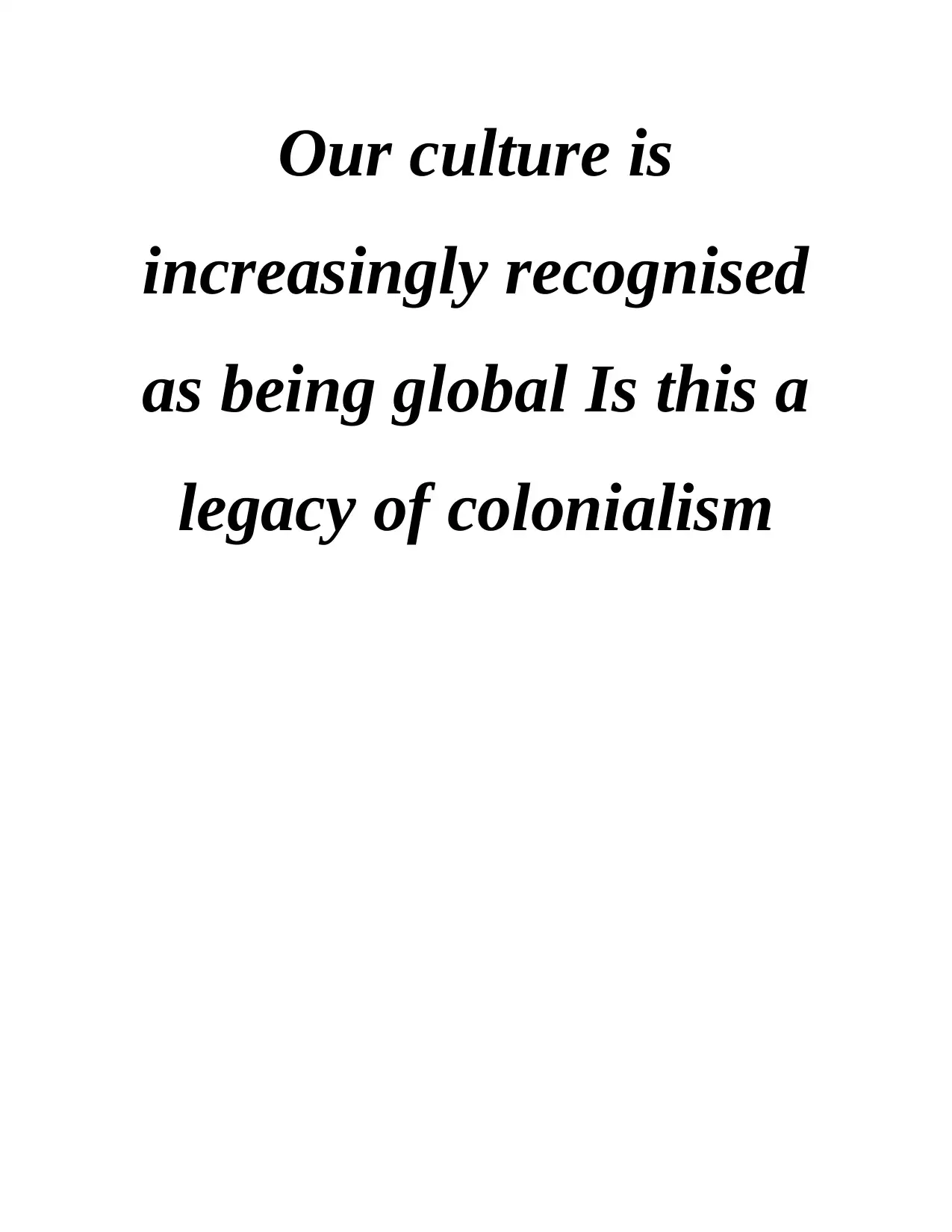
Our culture is
increasingly recognised
as being global Is this a
legacy of colonialism
increasingly recognised
as being global Is this a
legacy of colonialism
Paraphrase This Document
Need a fresh take? Get an instant paraphrase of this document with our AI Paraphraser
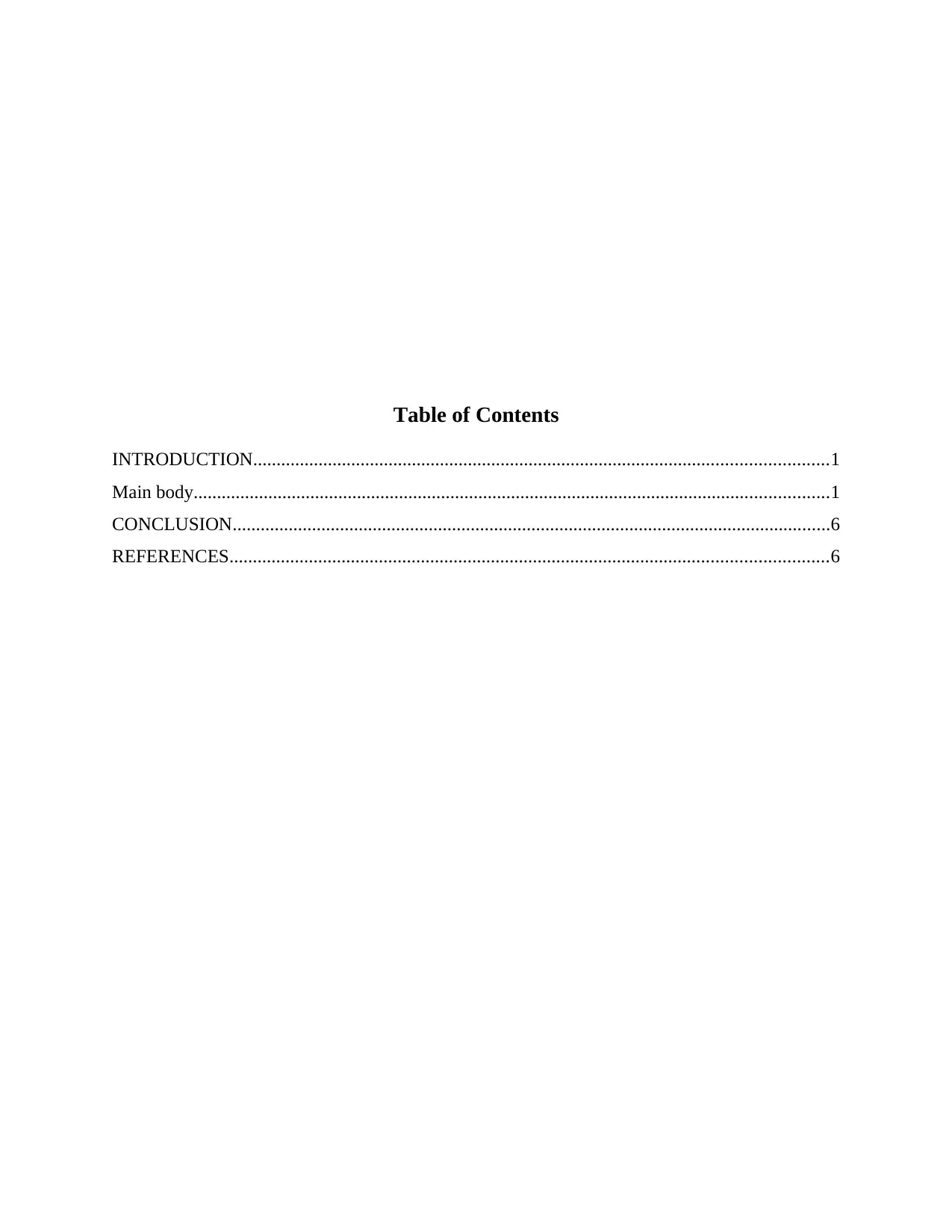
Table of Contents
INTRODUCTION...........................................................................................................................1
Main body........................................................................................................................................1
CONCLUSION................................................................................................................................6
REFERENCES................................................................................................................................6
INTRODUCTION...........................................................................................................................1
Main body........................................................................................................................................1
CONCLUSION................................................................................................................................6
REFERENCES................................................................................................................................6
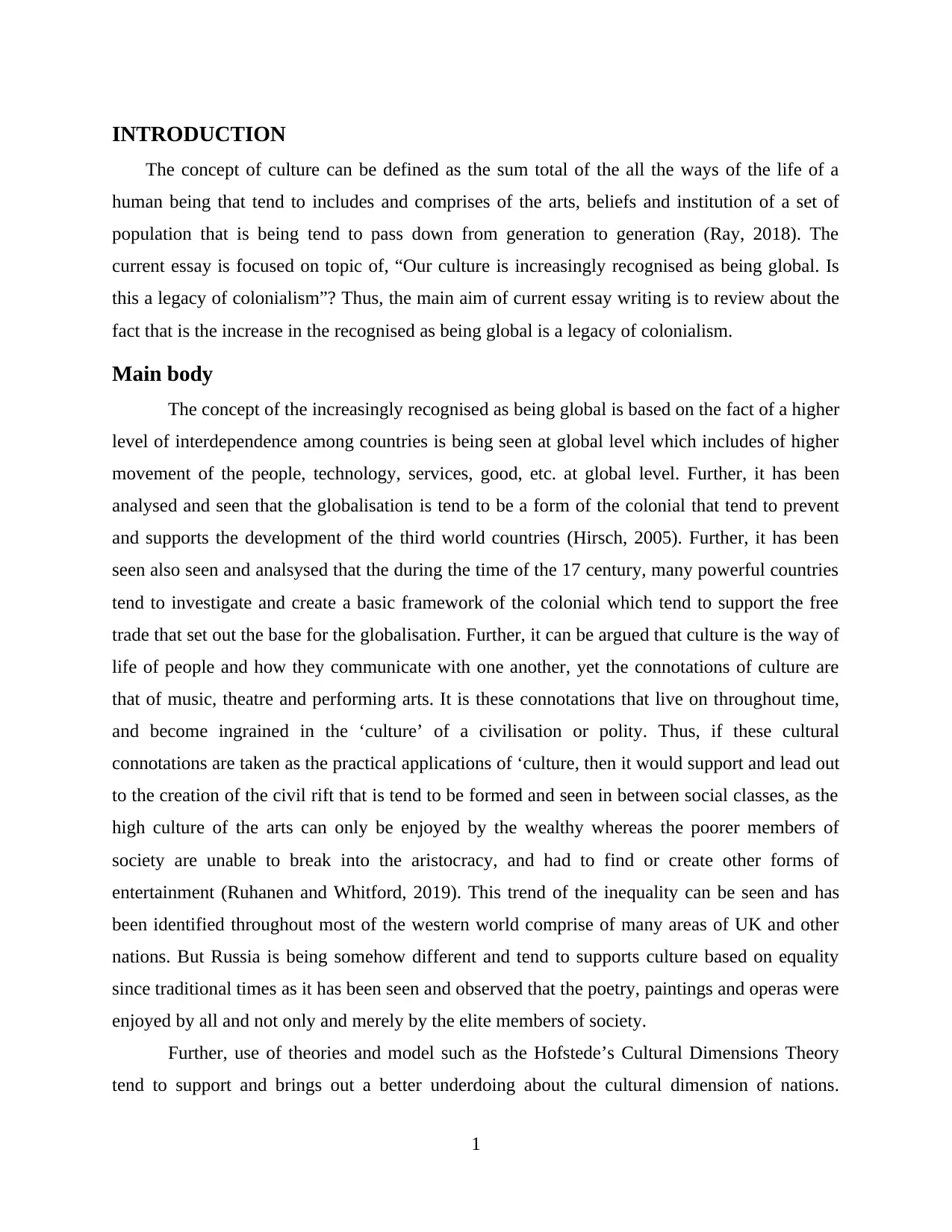
INTRODUCTION
The concept of culture can be defined as the sum total of the all the ways of the life of a
human being that tend to includes and comprises of the arts, beliefs and institution of a set of
population that is being tend to pass down from generation to generation (Ray, 2018). The
current essay is focused on topic of, “Our culture is increasingly recognised as being global. Is
this a legacy of colonialism”? Thus, the main aim of current essay writing is to review about the
fact that is the increase in the recognised as being global is a legacy of colonialism.
Main body
The concept of the increasingly recognised as being global is based on the fact of a higher
level of interdependence among countries is being seen at global level which includes of higher
movement of the people, technology, services, good, etc. at global level. Further, it has been
analysed and seen that the globalisation is tend to be a form of the colonial that tend to prevent
and supports the development of the third world countries (Hirsch, 2005). Further, it has been
seen also seen and analsysed that the during the time of the 17 century, many powerful countries
tend to investigate and create a basic framework of the colonial which tend to support the free
trade that set out the base for the globalisation. Further, it can be argued that culture is the way of
life of people and how they communicate with one another, yet the connotations of culture are
that of music, theatre and performing arts. It is these connotations that live on throughout time,
and become ingrained in the ‘culture’ of a civilisation or polity. Thus, if these cultural
connotations are taken as the practical applications of ‘culture, then it would support and lead out
to the creation of the civil rift that is tend to be formed and seen in between social classes, as the
high culture of the arts can only be enjoyed by the wealthy whereas the poorer members of
society are unable to break into the aristocracy, and had to find or create other forms of
entertainment (Ruhanen and Whitford, 2019). This trend of the inequality can be seen and has
been identified throughout most of the western world comprise of many areas of UK and other
nations. But Russia is being somehow different and tend to supports culture based on equality
since traditional times as it has been seen and observed that the poetry, paintings and operas were
enjoyed by all and not only and merely by the elite members of society.
Further, use of theories and model such as the Hofstede’s Cultural Dimensions Theory
tend to support and brings out a better underdoing about the cultural dimension of nations.
1
The concept of culture can be defined as the sum total of the all the ways of the life of a
human being that tend to includes and comprises of the arts, beliefs and institution of a set of
population that is being tend to pass down from generation to generation (Ray, 2018). The
current essay is focused on topic of, “Our culture is increasingly recognised as being global. Is
this a legacy of colonialism”? Thus, the main aim of current essay writing is to review about the
fact that is the increase in the recognised as being global is a legacy of colonialism.
Main body
The concept of the increasingly recognised as being global is based on the fact of a higher
level of interdependence among countries is being seen at global level which includes of higher
movement of the people, technology, services, good, etc. at global level. Further, it has been
analysed and seen that the globalisation is tend to be a form of the colonial that tend to prevent
and supports the development of the third world countries (Hirsch, 2005). Further, it has been
seen also seen and analsysed that the during the time of the 17 century, many powerful countries
tend to investigate and create a basic framework of the colonial which tend to support the free
trade that set out the base for the globalisation. Further, it can be argued that culture is the way of
life of people and how they communicate with one another, yet the connotations of culture are
that of music, theatre and performing arts. It is these connotations that live on throughout time,
and become ingrained in the ‘culture’ of a civilisation or polity. Thus, if these cultural
connotations are taken as the practical applications of ‘culture, then it would support and lead out
to the creation of the civil rift that is tend to be formed and seen in between social classes, as the
high culture of the arts can only be enjoyed by the wealthy whereas the poorer members of
society are unable to break into the aristocracy, and had to find or create other forms of
entertainment (Ruhanen and Whitford, 2019). This trend of the inequality can be seen and has
been identified throughout most of the western world comprise of many areas of UK and other
nations. But Russia is being somehow different and tend to supports culture based on equality
since traditional times as it has been seen and observed that the poetry, paintings and operas were
enjoyed by all and not only and merely by the elite members of society.
Further, use of theories and model such as the Hofstede’s Cultural Dimensions Theory
tend to support and brings out a better underdoing about the cultural dimension of nations.
1
⊘ This is a preview!⊘
Do you want full access?
Subscribe today to unlock all pages.

Trusted by 1+ million students worldwide
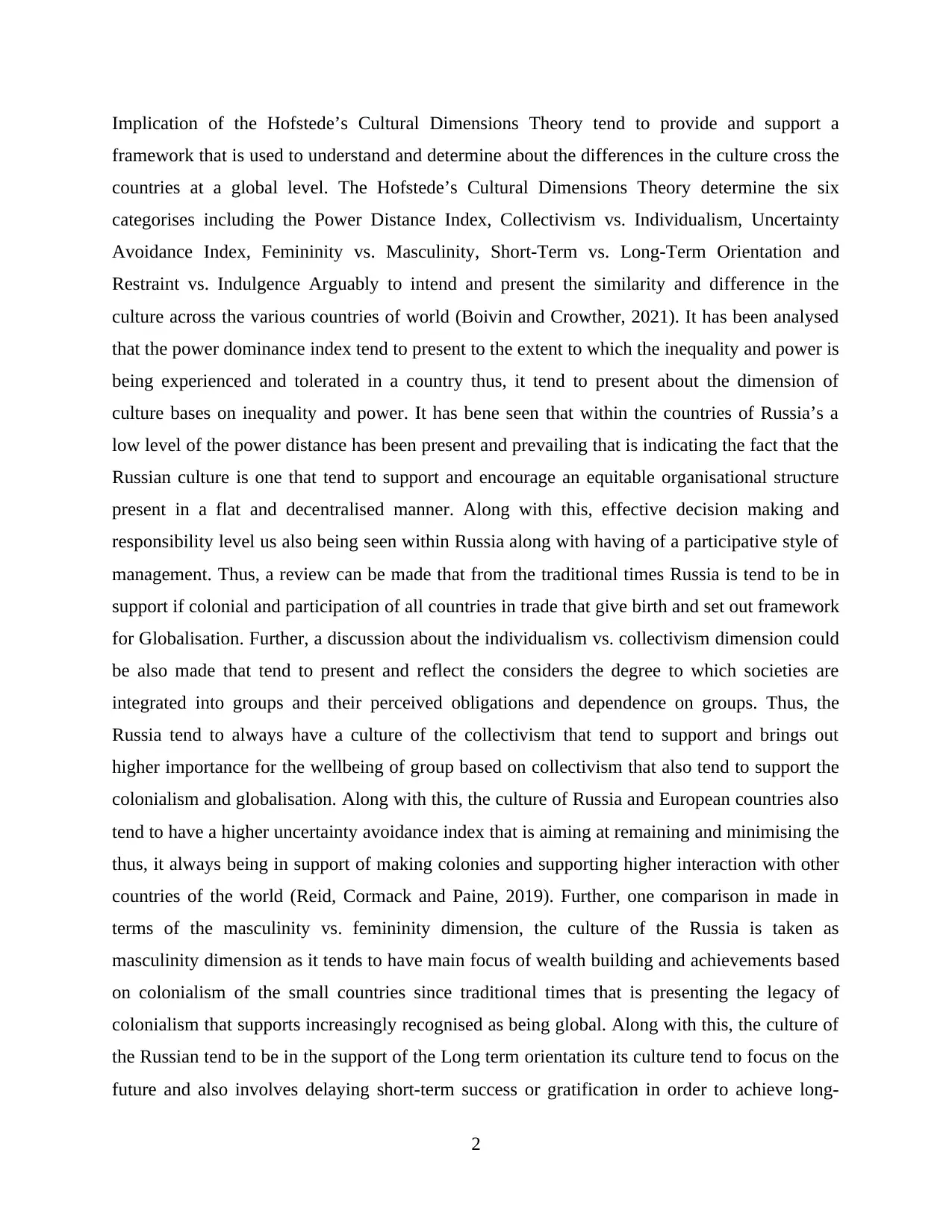
Implication of the Hofstede’s Cultural Dimensions Theory tend to provide and support a
framework that is used to understand and determine about the differences in the culture cross the
countries at a global level. The Hofstede’s Cultural Dimensions Theory determine the six
categorises including the Power Distance Index, Collectivism vs. Individualism, Uncertainty
Avoidance Index, Femininity vs. Masculinity, Short-Term vs. Long-Term Orientation and
Restraint vs. Indulgence Arguably to intend and present the similarity and difference in the
culture across the various countries of world (Boivin and Crowther, 2021). It has been analysed
that the power dominance index tend to present to the extent to which the inequality and power is
being experienced and tolerated in a country thus, it tend to present about the dimension of
culture bases on inequality and power. It has bene seen that within the countries of Russia’s a
low level of the power distance has been present and prevailing that is indicating the fact that the
Russian culture is one that tend to support and encourage an equitable organisational structure
present in a flat and decentralised manner. Along with this, effective decision making and
responsibility level us also being seen within Russia along with having of a participative style of
management. Thus, a review can be made that from the traditional times Russia is tend to be in
support if colonial and participation of all countries in trade that give birth and set out framework
for Globalisation. Further, a discussion about the individualism vs. collectivism dimension could
be also made that tend to present and reflect the considers the degree to which societies are
integrated into groups and their perceived obligations and dependence on groups. Thus, the
Russia tend to always have a culture of the collectivism that tend to support and brings out
higher importance for the wellbeing of group based on collectivism that also tend to support the
colonialism and globalisation. Along with this, the culture of Russia and European countries also
tend to have a higher uncertainty avoidance index that is aiming at remaining and minimising the
thus, it always being in support of making colonies and supporting higher interaction with other
countries of the world (Reid, Cormack and Paine, 2019). Further, one comparison in made in
terms of the masculinity vs. femininity dimension, the culture of the Russia is taken as
masculinity dimension as it tends to have main focus of wealth building and achievements based
on colonialism of the small countries since traditional times that is presenting the legacy of
colonialism that supports increasingly recognised as being global. Along with this, the culture of
the Russian tend to be in the support of the Long term orientation its culture tend to focus on the
future and also involves delaying short-term success or gratification in order to achieve long-
2
framework that is used to understand and determine about the differences in the culture cross the
countries at a global level. The Hofstede’s Cultural Dimensions Theory determine the six
categorises including the Power Distance Index, Collectivism vs. Individualism, Uncertainty
Avoidance Index, Femininity vs. Masculinity, Short-Term vs. Long-Term Orientation and
Restraint vs. Indulgence Arguably to intend and present the similarity and difference in the
culture across the various countries of world (Boivin and Crowther, 2021). It has been analysed
that the power dominance index tend to present to the extent to which the inequality and power is
being experienced and tolerated in a country thus, it tend to present about the dimension of
culture bases on inequality and power. It has bene seen that within the countries of Russia’s a
low level of the power distance has been present and prevailing that is indicating the fact that the
Russian culture is one that tend to support and encourage an equitable organisational structure
present in a flat and decentralised manner. Along with this, effective decision making and
responsibility level us also being seen within Russia along with having of a participative style of
management. Thus, a review can be made that from the traditional times Russia is tend to be in
support if colonial and participation of all countries in trade that give birth and set out framework
for Globalisation. Further, a discussion about the individualism vs. collectivism dimension could
be also made that tend to present and reflect the considers the degree to which societies are
integrated into groups and their perceived obligations and dependence on groups. Thus, the
Russia tend to always have a culture of the collectivism that tend to support and brings out
higher importance for the wellbeing of group based on collectivism that also tend to support the
colonialism and globalisation. Along with this, the culture of Russia and European countries also
tend to have a higher uncertainty avoidance index that is aiming at remaining and minimising the
thus, it always being in support of making colonies and supporting higher interaction with other
countries of the world (Reid, Cormack and Paine, 2019). Further, one comparison in made in
terms of the masculinity vs. femininity dimension, the culture of the Russia is taken as
masculinity dimension as it tends to have main focus of wealth building and achievements based
on colonialism of the small countries since traditional times that is presenting the legacy of
colonialism that supports increasingly recognised as being global. Along with this, the culture of
the Russian tend to be in the support of the Long term orientation its culture tend to focus on the
future and also involves delaying short-term success or gratification in order to achieve long-
2
Paraphrase This Document
Need a fresh take? Get an instant paraphrase of this document with our AI Paraphraser
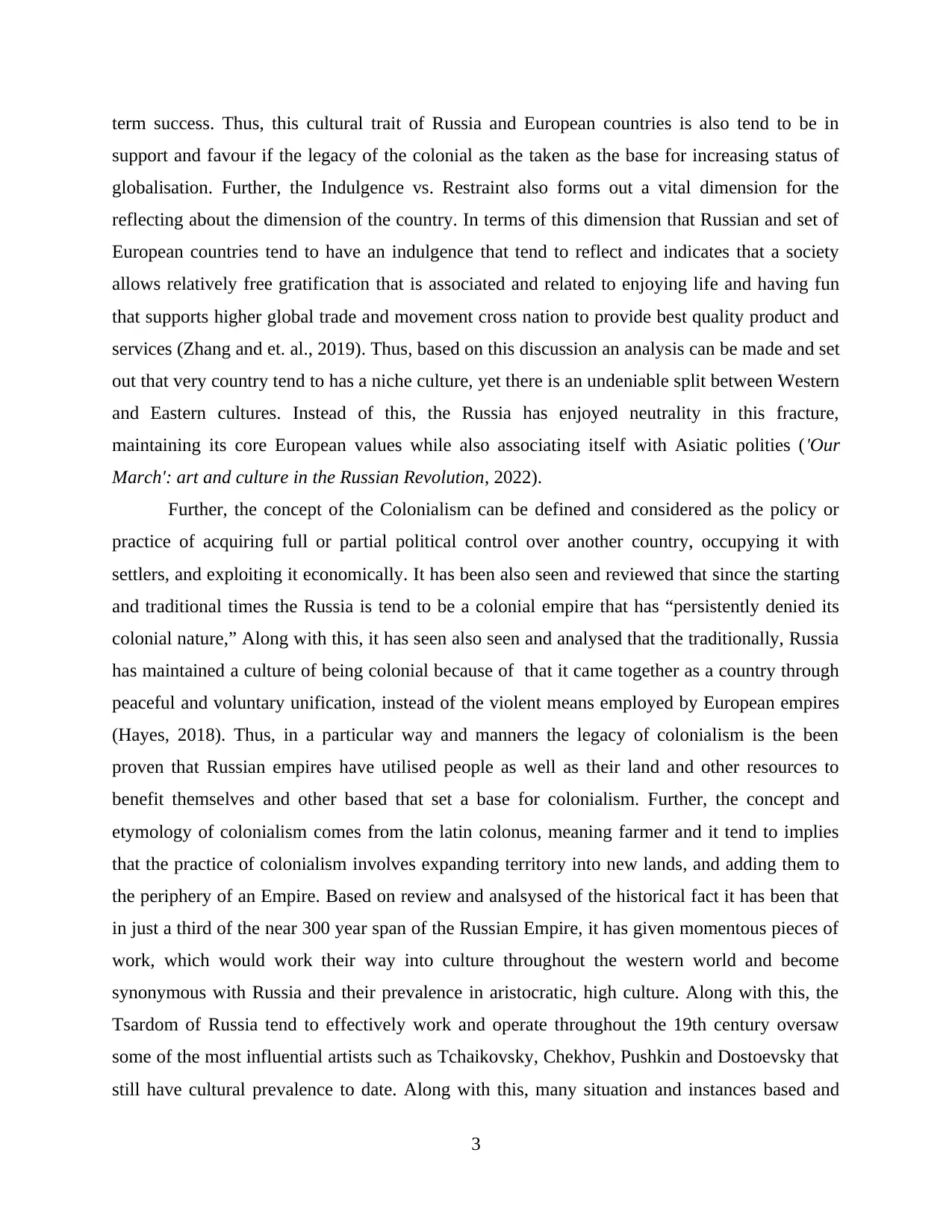
term success. Thus, this cultural trait of Russia and European countries is also tend to be in
support and favour if the legacy of the colonial as the taken as the base for increasing status of
globalisation. Further, the Indulgence vs. Restraint also forms out a vital dimension for the
reflecting about the dimension of the country. In terms of this dimension that Russian and set of
European countries tend to have an indulgence that tend to reflect and indicates that a society
allows relatively free gratification that is associated and related to enjoying life and having fun
that supports higher global trade and movement cross nation to provide best quality product and
services (Zhang and et. al., 2019). Thus, based on this discussion an analysis can be made and set
out that very country tend to has a niche culture, yet there is an undeniable split between Western
and Eastern cultures. Instead of this, the Russia has enjoyed neutrality in this fracture,
maintaining its core European values while also associating itself with Asiatic polities ('Our
March': art and culture in the Russian Revolution, 2022).
Further, the concept of the Colonialism can be defined and considered as the policy or
practice of acquiring full or partial political control over another country, occupying it with
settlers, and exploiting it economically. It has been also seen and reviewed that since the starting
and traditional times the Russia is tend to be a colonial empire that has “persistently denied its
colonial nature,” Along with this, it has seen also seen and analysed that the traditionally, Russia
has maintained a culture of being colonial because of that it came together as a country through
peaceful and voluntary unification, instead of the violent means employed by European empires
(Hayes, 2018). Thus, in a particular way and manners the legacy of colonialism is the been
proven that Russian empires have utilised people as well as their land and other resources to
benefit themselves and other based that set a base for colonialism. Further, the concept and
etymology of colonialism comes from the latin colonus, meaning farmer and it tend to implies
that the practice of colonialism involves expanding territory into new lands, and adding them to
the periphery of an Empire. Based on review and analsysed of the historical fact it has been that
in just a third of the near 300 year span of the Russian Empire, it has given momentous pieces of
work, which would work their way into culture throughout the western world and become
synonymous with Russia and their prevalence in aristocratic, high culture. Along with this, the
Tsardom of Russia tend to effectively work and operate throughout the 19th century oversaw
some of the most influential artists such as Tchaikovsky, Chekhov, Pushkin and Dostoevsky that
still have cultural prevalence to date. Along with this, many situation and instances based and
3
support and favour if the legacy of the colonial as the taken as the base for increasing status of
globalisation. Further, the Indulgence vs. Restraint also forms out a vital dimension for the
reflecting about the dimension of the country. In terms of this dimension that Russian and set of
European countries tend to have an indulgence that tend to reflect and indicates that a society
allows relatively free gratification that is associated and related to enjoying life and having fun
that supports higher global trade and movement cross nation to provide best quality product and
services (Zhang and et. al., 2019). Thus, based on this discussion an analysis can be made and set
out that very country tend to has a niche culture, yet there is an undeniable split between Western
and Eastern cultures. Instead of this, the Russia has enjoyed neutrality in this fracture,
maintaining its core European values while also associating itself with Asiatic polities ('Our
March': art and culture in the Russian Revolution, 2022).
Further, the concept of the Colonialism can be defined and considered as the policy or
practice of acquiring full or partial political control over another country, occupying it with
settlers, and exploiting it economically. It has been also seen and reviewed that since the starting
and traditional times the Russia is tend to be a colonial empire that has “persistently denied its
colonial nature,” Along with this, it has seen also seen and analysed that the traditionally, Russia
has maintained a culture of being colonial because of that it came together as a country through
peaceful and voluntary unification, instead of the violent means employed by European empires
(Hayes, 2018). Thus, in a particular way and manners the legacy of colonialism is the been
proven that Russian empires have utilised people as well as their land and other resources to
benefit themselves and other based that set a base for colonialism. Further, the concept and
etymology of colonialism comes from the latin colonus, meaning farmer and it tend to implies
that the practice of colonialism involves expanding territory into new lands, and adding them to
the periphery of an Empire. Based on review and analsysed of the historical fact it has been that
in just a third of the near 300 year span of the Russian Empire, it has given momentous pieces of
work, which would work their way into culture throughout the western world and become
synonymous with Russia and their prevalence in aristocratic, high culture. Along with this, the
Tsardom of Russia tend to effectively work and operate throughout the 19th century oversaw
some of the most influential artists such as Tchaikovsky, Chekhov, Pushkin and Dostoevsky that
still have cultural prevalence to date. Along with this, many situation and instances based and
3
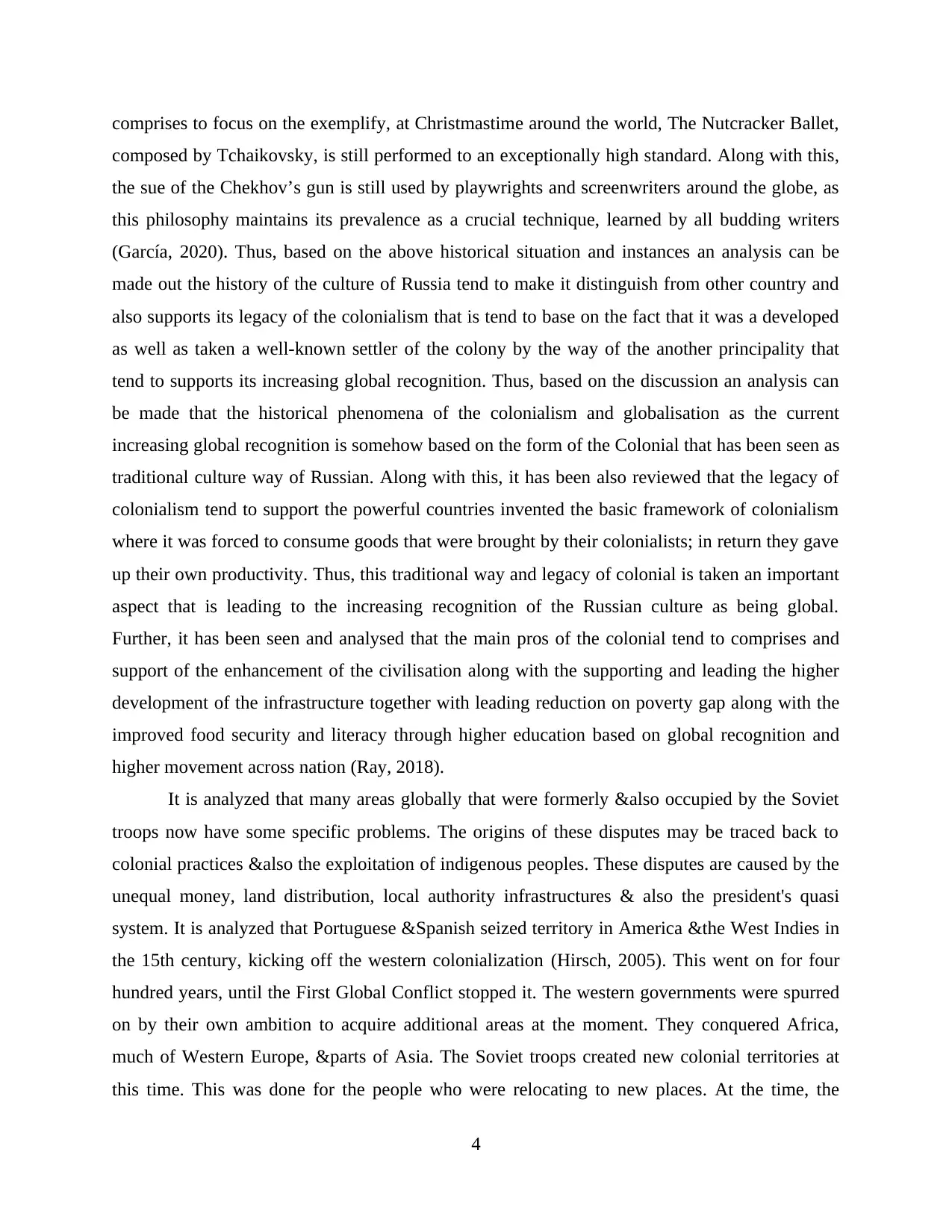
comprises to focus on the exemplify, at Christmastime around the world, The Nutcracker Ballet,
composed by Tchaikovsky, is still performed to an exceptionally high standard. Along with this,
the sue of the Chekhov’s gun is still used by playwrights and screenwriters around the globe, as
this philosophy maintains its prevalence as a crucial technique, learned by all budding writers
(García, 2020). Thus, based on the above historical situation and instances an analysis can be
made out the history of the culture of Russia tend to make it distinguish from other country and
also supports its legacy of the colonialism that is tend to base on the fact that it was a developed
as well as taken a well-known settler of the colony by the way of the another principality that
tend to supports its increasing global recognition. Thus, based on the discussion an analysis can
be made that the historical phenomena of the colonialism and globalisation as the current
increasing global recognition is somehow based on the form of the Colonial that has been seen as
traditional culture way of Russian. Along with this, it has been also reviewed that the legacy of
colonialism tend to support the powerful countries invented the basic framework of colonialism
where it was forced to consume goods that were brought by their colonialists; in return they gave
up their own productivity. Thus, this traditional way and legacy of colonial is taken an important
aspect that is leading to the increasing recognition of the Russian culture as being global.
Further, it has been seen and analysed that the main pros of the colonial tend to comprises and
support of the enhancement of the civilisation along with the supporting and leading the higher
development of the infrastructure together with leading reduction on poverty gap along with the
improved food security and literacy through higher education based on global recognition and
higher movement across nation (Ray, 2018).
It is analyzed that many areas globally that were formerly &also occupied by the Soviet
troops now have some specific problems. The origins of these disputes may be traced back to
colonial practices &also the exploitation of indigenous peoples. These disputes are caused by the
unequal money, land distribution, local authority infrastructures & also the president's quasi
system. It is analyzed that Portuguese &Spanish seized territory in America &the West Indies in
the 15th century, kicking off the western colonialization (Hirsch, 2005). This went on for four
hundred years, until the First Global Conflict stopped it. The western governments were spurred
on by their own ambition to acquire additional areas at the moment. They conquered Africa,
much of Western Europe, &parts of Asia. The Soviet troops created new colonial territories at
this time. This was done for the people who were relocating to new places. At the time, the
4
composed by Tchaikovsky, is still performed to an exceptionally high standard. Along with this,
the sue of the Chekhov’s gun is still used by playwrights and screenwriters around the globe, as
this philosophy maintains its prevalence as a crucial technique, learned by all budding writers
(García, 2020). Thus, based on the above historical situation and instances an analysis can be
made out the history of the culture of Russia tend to make it distinguish from other country and
also supports its legacy of the colonialism that is tend to base on the fact that it was a developed
as well as taken a well-known settler of the colony by the way of the another principality that
tend to supports its increasing global recognition. Thus, based on the discussion an analysis can
be made that the historical phenomena of the colonialism and globalisation as the current
increasing global recognition is somehow based on the form of the Colonial that has been seen as
traditional culture way of Russian. Along with this, it has been also reviewed that the legacy of
colonialism tend to support the powerful countries invented the basic framework of colonialism
where it was forced to consume goods that were brought by their colonialists; in return they gave
up their own productivity. Thus, this traditional way and legacy of colonial is taken an important
aspect that is leading to the increasing recognition of the Russian culture as being global.
Further, it has been seen and analysed that the main pros of the colonial tend to comprises and
support of the enhancement of the civilisation along with the supporting and leading the higher
development of the infrastructure together with leading reduction on poverty gap along with the
improved food security and literacy through higher education based on global recognition and
higher movement across nation (Ray, 2018).
It is analyzed that many areas globally that were formerly &also occupied by the Soviet
troops now have some specific problems. The origins of these disputes may be traced back to
colonial practices &also the exploitation of indigenous peoples. These disputes are caused by the
unequal money, land distribution, local authority infrastructures & also the president's quasi
system. It is analyzed that Portuguese &Spanish seized territory in America &the West Indies in
the 15th century, kicking off the western colonialization (Hirsch, 2005). This went on for four
hundred years, until the First Global Conflict stopped it. The western governments were spurred
on by their own ambition to acquire additional areas at the moment. They conquered Africa,
much of Western Europe, &parts of Asia. The Soviet troops created new colonial territories at
this time. This was done for the people who were relocating to new places. At the time, the
4
⊘ This is a preview!⊘
Do you want full access?
Subscribe today to unlock all pages.

Trusted by 1+ million students worldwide
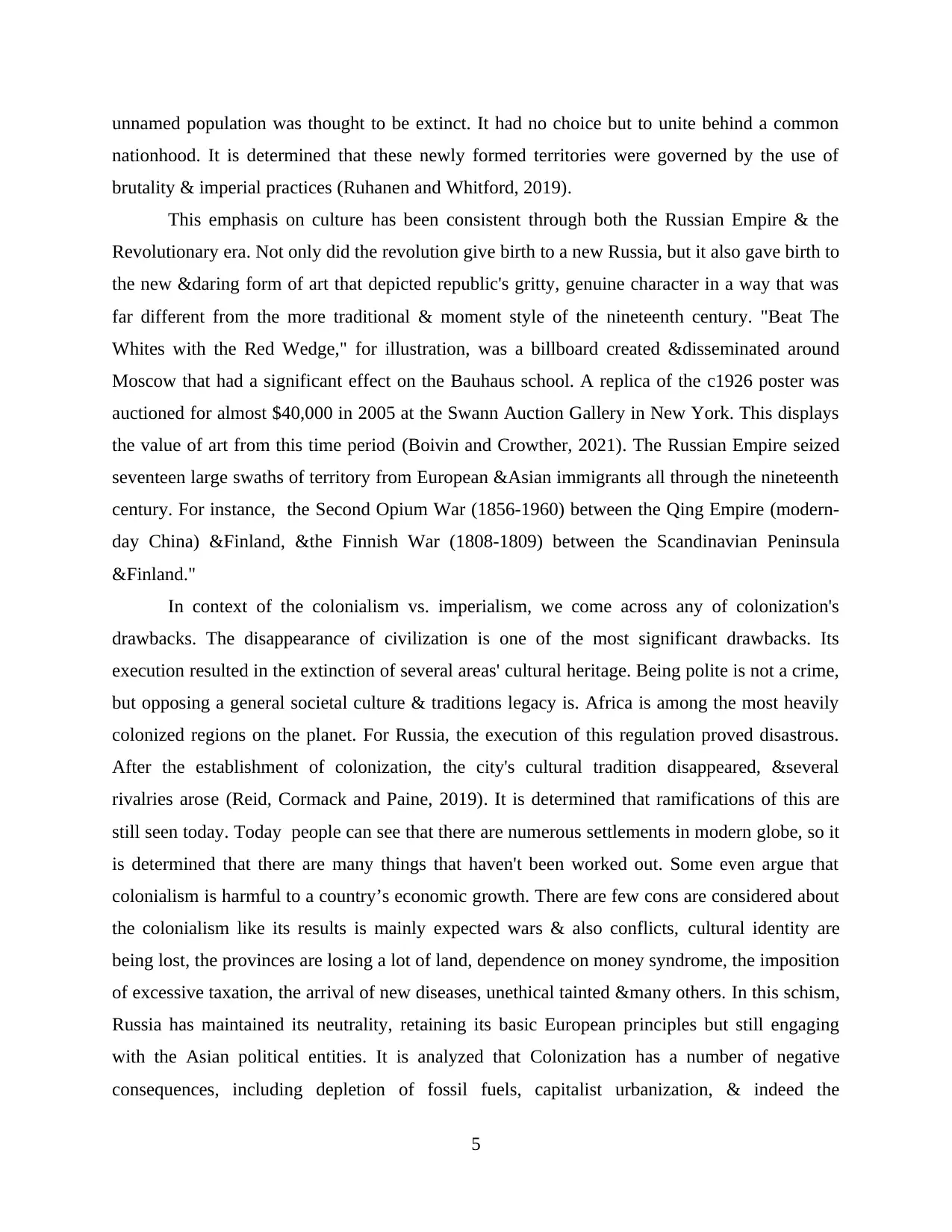
unnamed population was thought to be extinct. It had no choice but to unite behind a common
nationhood. It is determined that these newly formed territories were governed by the use of
brutality & imperial practices (Ruhanen and Whitford, 2019).
This emphasis on culture has been consistent through both the Russian Empire & the
Revolutionary era. Not only did the revolution give birth to a new Russia, but it also gave birth to
the new &daring form of art that depicted republic's gritty, genuine character in a way that was
far different from the more traditional & moment style of the nineteenth century. "Beat The
Whites with the Red Wedge," for illustration, was a billboard created &disseminated around
Moscow that had a significant effect on the Bauhaus school. A replica of the c1926 poster was
auctioned for almost $40,000 in 2005 at the Swann Auction Gallery in New York. This displays
the value of art from this time period (Boivin and Crowther, 2021). The Russian Empire seized
seventeen large swaths of territory from European &Asian immigrants all through the nineteenth
century. For instance, the Second Opium War (1856-1960) between the Qing Empire (modern-
day China) &Finland, &the Finnish War (1808-1809) between the Scandinavian Peninsula
&Finland."
In context of the colonialism vs. imperialism, we come across any of colonization's
drawbacks. The disappearance of civilization is one of the most significant drawbacks. Its
execution resulted in the extinction of several areas' cultural heritage. Being polite is not a crime,
but opposing a general societal culture & traditions legacy is. Africa is among the most heavily
colonized regions on the planet. For Russia, the execution of this regulation proved disastrous.
After the establishment of colonization, the city's cultural tradition disappeared, &several
rivalries arose (Reid, Cormack and Paine, 2019). It is determined that ramifications of this are
still seen today. Today people can see that there are numerous settlements in modern globe, so it
is determined that there are many things that haven't been worked out. Some even argue that
colonialism is harmful to a country’s economic growth. There are few cons are considered about
the colonialism like its results is mainly expected wars & also conflicts, cultural identity are
being lost, the provinces are losing a lot of land, dependence on money syndrome, the imposition
of excessive taxation, the arrival of new diseases, unethical tainted &many others. In this schism,
Russia has maintained its neutrality, retaining its basic European principles but still engaging
with the Asian political entities. It is analyzed that Colonization has a number of negative
consequences, including depletion of fossil fuels, capitalist urbanization, & indeed the
5
nationhood. It is determined that these newly formed territories were governed by the use of
brutality & imperial practices (Ruhanen and Whitford, 2019).
This emphasis on culture has been consistent through both the Russian Empire & the
Revolutionary era. Not only did the revolution give birth to a new Russia, but it also gave birth to
the new &daring form of art that depicted republic's gritty, genuine character in a way that was
far different from the more traditional & moment style of the nineteenth century. "Beat The
Whites with the Red Wedge," for illustration, was a billboard created &disseminated around
Moscow that had a significant effect on the Bauhaus school. A replica of the c1926 poster was
auctioned for almost $40,000 in 2005 at the Swann Auction Gallery in New York. This displays
the value of art from this time period (Boivin and Crowther, 2021). The Russian Empire seized
seventeen large swaths of territory from European &Asian immigrants all through the nineteenth
century. For instance, the Second Opium War (1856-1960) between the Qing Empire (modern-
day China) &Finland, &the Finnish War (1808-1809) between the Scandinavian Peninsula
&Finland."
In context of the colonialism vs. imperialism, we come across any of colonization's
drawbacks. The disappearance of civilization is one of the most significant drawbacks. Its
execution resulted in the extinction of several areas' cultural heritage. Being polite is not a crime,
but opposing a general societal culture & traditions legacy is. Africa is among the most heavily
colonized regions on the planet. For Russia, the execution of this regulation proved disastrous.
After the establishment of colonization, the city's cultural tradition disappeared, &several
rivalries arose (Reid, Cormack and Paine, 2019). It is determined that ramifications of this are
still seen today. Today people can see that there are numerous settlements in modern globe, so it
is determined that there are many things that haven't been worked out. Some even argue that
colonialism is harmful to a country’s economic growth. There are few cons are considered about
the colonialism like its results is mainly expected wars & also conflicts, cultural identity are
being lost, the provinces are losing a lot of land, dependence on money syndrome, the imposition
of excessive taxation, the arrival of new diseases, unethical tainted &many others. In this schism,
Russia has maintained its neutrality, retaining its basic European principles but still engaging
with the Asian political entities. It is analyzed that Colonization has a number of negative
consequences, including depletion of fossil fuels, capitalist urbanization, & indeed the
5
Paraphrase This Document
Need a fresh take? Get an instant paraphrase of this document with our AI Paraphraser
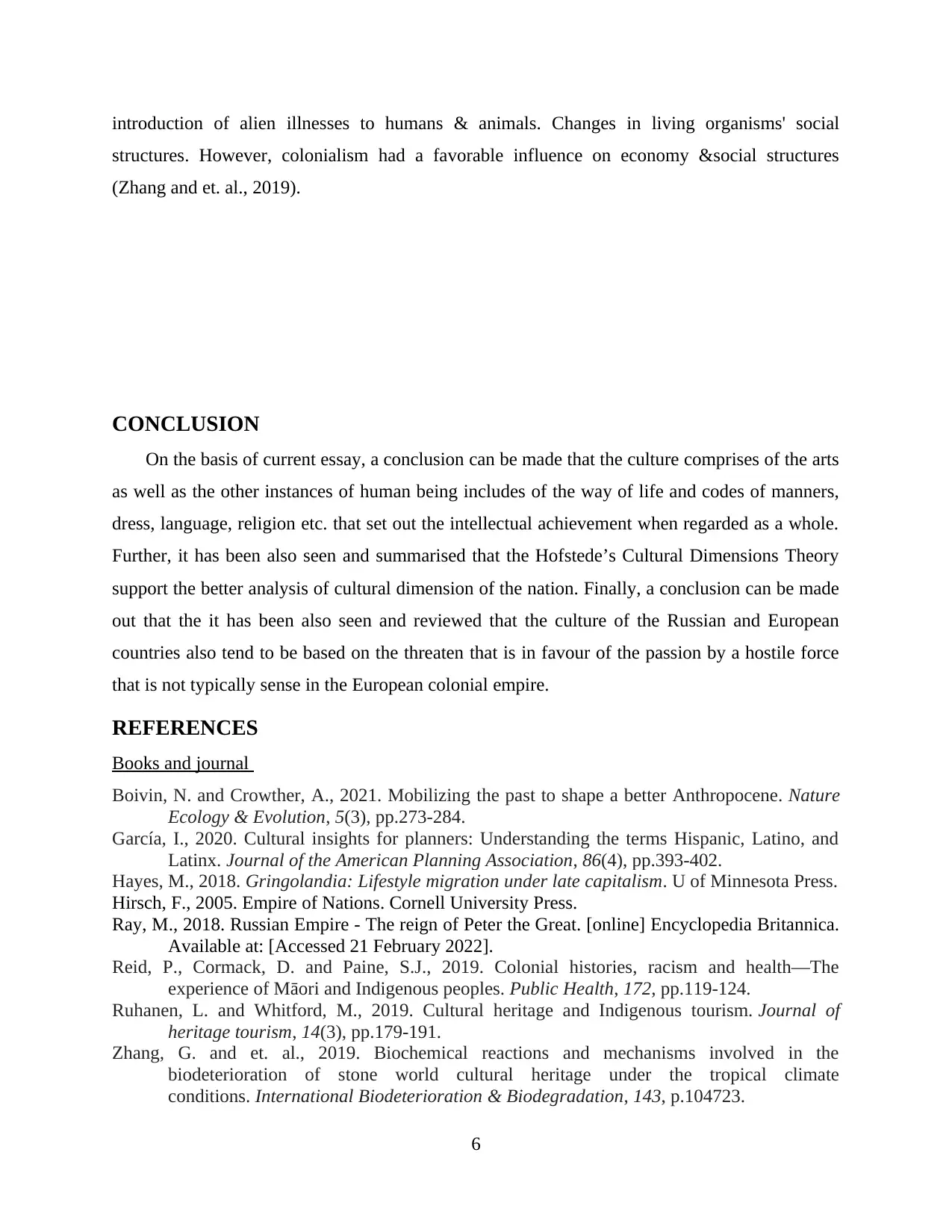
introduction of alien illnesses to humans & animals. Changes in living organisms' social
structures. However, colonialism had a favorable influence on economy &social structures
(Zhang and et. al., 2019).
CONCLUSION
On the basis of current essay, a conclusion can be made that the culture comprises of the arts
as well as the other instances of human being includes of the way of life and codes of manners,
dress, language, religion etc. that set out the intellectual achievement when regarded as a whole.
Further, it has been also seen and summarised that the Hofstede’s Cultural Dimensions Theory
support the better analysis of cultural dimension of the nation. Finally, a conclusion can be made
out that the it has been also seen and reviewed that the culture of the Russian and European
countries also tend to be based on the threaten that is in favour of the passion by a hostile force
that is not typically sense in the European colonial empire.
REFERENCES
Books and journal
Boivin, N. and Crowther, A., 2021. Mobilizing the past to shape a better Anthropocene. Nature
Ecology & Evolution, 5(3), pp.273-284.
García, I., 2020. Cultural insights for planners: Understanding the terms Hispanic, Latino, and
Latinx. Journal of the American Planning Association, 86(4), pp.393-402.
Hayes, M., 2018. Gringolandia: Lifestyle migration under late capitalism. U of Minnesota Press.
Hirsch, F., 2005. Empire of Nations. Cornell University Press.
Ray, M., 2018. Russian Empire - The reign of Peter the Great. [online] Encyclopedia Britannica.
Available at: [Accessed 21 February 2022].
Reid, P., Cormack, D. and Paine, S.J., 2019. Colonial histories, racism and health—The
experience of Māori and Indigenous peoples. Public Health, 172, pp.119-124.
Ruhanen, L. and Whitford, M., 2019. Cultural heritage and Indigenous tourism. Journal of
heritage tourism, 14(3), pp.179-191.
Zhang, G. and et. al., 2019. Biochemical reactions and mechanisms involved in the
biodeterioration of stone world cultural heritage under the tropical climate
conditions. International Biodeterioration & Biodegradation, 143, p.104723.
6
structures. However, colonialism had a favorable influence on economy &social structures
(Zhang and et. al., 2019).
CONCLUSION
On the basis of current essay, a conclusion can be made that the culture comprises of the arts
as well as the other instances of human being includes of the way of life and codes of manners,
dress, language, religion etc. that set out the intellectual achievement when regarded as a whole.
Further, it has been also seen and summarised that the Hofstede’s Cultural Dimensions Theory
support the better analysis of cultural dimension of the nation. Finally, a conclusion can be made
out that the it has been also seen and reviewed that the culture of the Russian and European
countries also tend to be based on the threaten that is in favour of the passion by a hostile force
that is not typically sense in the European colonial empire.
REFERENCES
Books and journal
Boivin, N. and Crowther, A., 2021. Mobilizing the past to shape a better Anthropocene. Nature
Ecology & Evolution, 5(3), pp.273-284.
García, I., 2020. Cultural insights for planners: Understanding the terms Hispanic, Latino, and
Latinx. Journal of the American Planning Association, 86(4), pp.393-402.
Hayes, M., 2018. Gringolandia: Lifestyle migration under late capitalism. U of Minnesota Press.
Hirsch, F., 2005. Empire of Nations. Cornell University Press.
Ray, M., 2018. Russian Empire - The reign of Peter the Great. [online] Encyclopedia Britannica.
Available at: [Accessed 21 February 2022].
Reid, P., Cormack, D. and Paine, S.J., 2019. Colonial histories, racism and health—The
experience of Māori and Indigenous peoples. Public Health, 172, pp.119-124.
Ruhanen, L. and Whitford, M., 2019. Cultural heritage and Indigenous tourism. Journal of
heritage tourism, 14(3), pp.179-191.
Zhang, G. and et. al., 2019. Biochemical reactions and mechanisms involved in the
biodeterioration of stone world cultural heritage under the tropical climate
conditions. International Biodeterioration & Biodegradation, 143, p.104723.
6
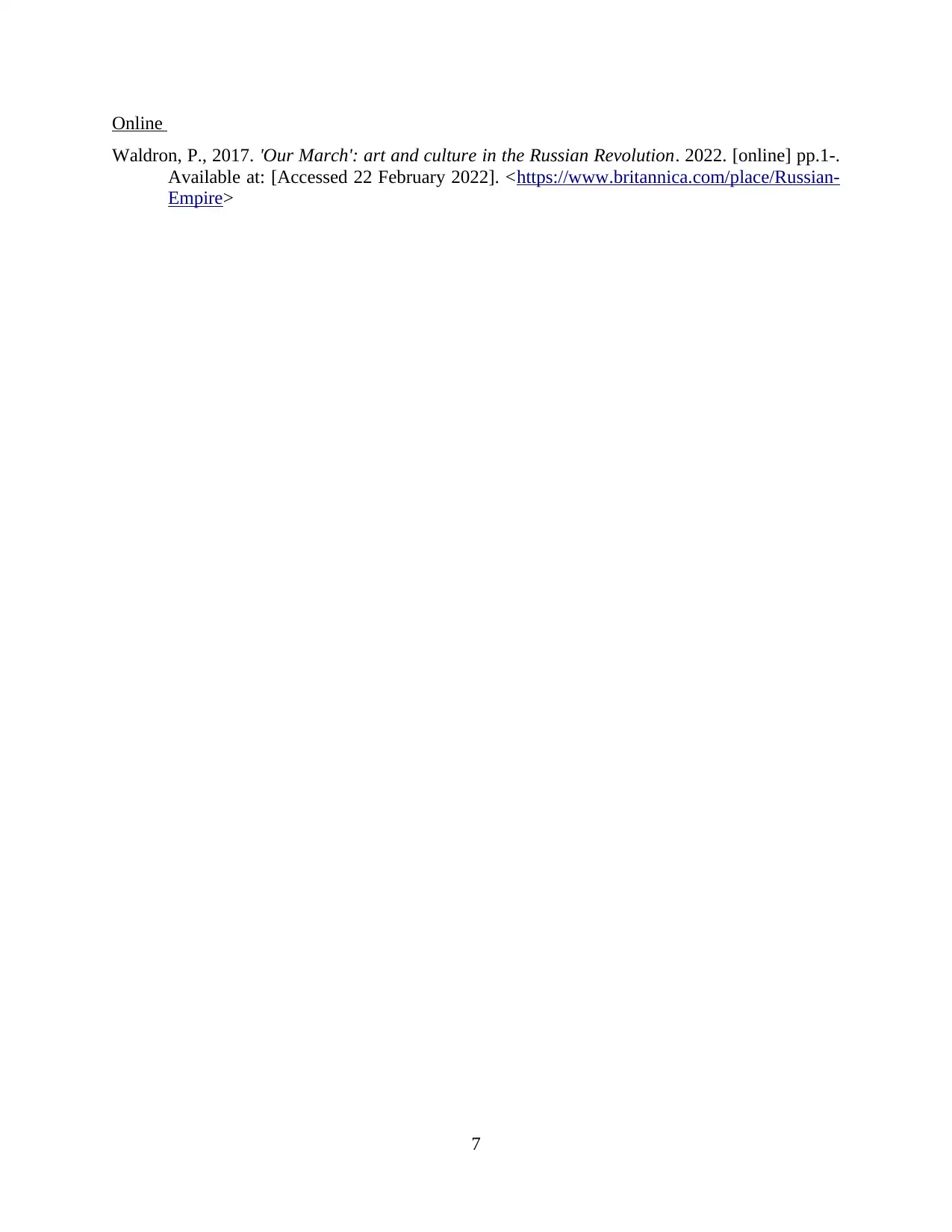
Online
Waldron, P., 2017. 'Our March': art and culture in the Russian Revolution. 2022. [online] pp.1-.
Available at: [Accessed 22 February 2022]. <https://www.britannica.com/place/Russian-
Empire>
7
Waldron, P., 2017. 'Our March': art and culture in the Russian Revolution. 2022. [online] pp.1-.
Available at: [Accessed 22 February 2022]. <https://www.britannica.com/place/Russian-
Empire>
7
⊘ This is a preview!⊘
Do you want full access?
Subscribe today to unlock all pages.

Trusted by 1+ million students worldwide
1 out of 9
Your All-in-One AI-Powered Toolkit for Academic Success.
+13062052269
info@desklib.com
Available 24*7 on WhatsApp / Email
![[object Object]](/_next/static/media/star-bottom.7253800d.svg)
Unlock your academic potential
Copyright © 2020–2026 A2Z Services. All Rights Reserved. Developed and managed by ZUCOL.

